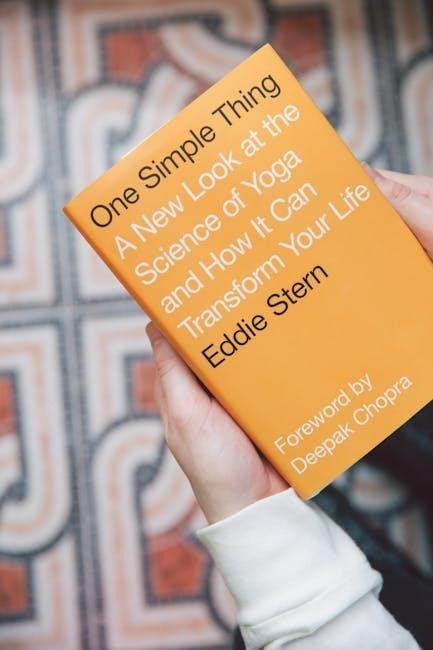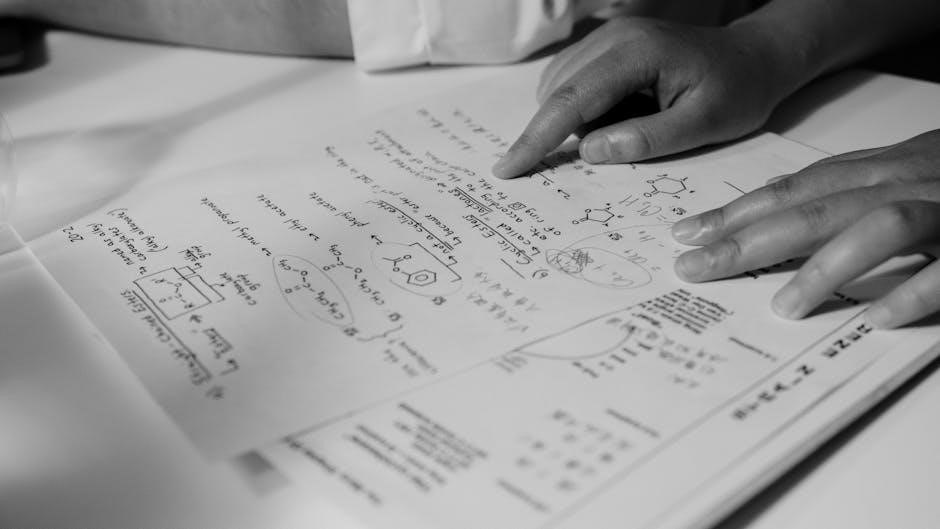
Top-Rated Study Guides for AP Physics
Top-rated study guides for AP Physics include comprehensive resources like the AP Physics Exam Secrets Study Guide and Barron’s AP Physics 1 and 2 Study Guide. Both offer detailed explanations, practice questions, and expert tips to master key concepts, ensuring thorough preparation for the exam.
AP Physics Exam Secrets Study Guide
The AP Physics Exam Secrets Study Guide is a highly recommended resource for students preparing for the exam. It provides a detailed review of key concepts, strategies, and common mistakes to avoid. Available on Amazon with an ISBN of 9781609711801, this guide is designed to help students master challenging topics in AP Physics 1. It includes practice questions, expert tips, and comprehensive explanations to ensure a deep understanding of the material. The guide is particularly useful for identifying and addressing misconceptions, making it an essential tool for both self-study and classroom use. Its clear structure and focus on high-yield topics make it a top choice for achieving success on the AP Physics exam.
Barron’s AP Physics 1 and 2 Study Guide

Barron’s AP Physics 1 and 2 Study Guide is a top-tier resource for students aiming to excel in both courses. This comprehensive guide, authored by Kenneth Rideout and Jonathan Wolf, is widely praised for its thorough preparation. It includes practice questions, detailed answers, and clear explanations to help students grasp complex concepts. The guide also features a full-length practice exam, enabling students to simulate test-day conditions. Its organized structure and focus on essential topics make it an ideal companion for systematic study. Many reviewers highlight its effectiveness in building confidence and improving performance. Whether used for self-study or supplementary learning, Barron’s guide is a valuable tool for achieving success in AP Physics 1 and 2.

Core Topics Covered in AP Physics Study Guides
AP Physics study guides thoroughly cover essential topics like kinematics, dynamics, momentum, energy, and mechanical waves. These resources provide detailed explanations and problems to master foundational physics concepts effectively.
Kinematics and Dynamics
Kinematics and dynamics are foundational topics in AP Physics, focusing on motion and forces. Kinematics involves the study of motion graphs, velocity, and acceleration, while dynamics explores Newton’s laws, force, and momentum. These concepts are crucial for understanding how objects move and respond to external influences. Study guides provide detailed explanations, sample problems, and visual aids to help students grasp these principles. For instance, kinematics problems often involve analyzing position-time and velocity-time graphs to determine motion characteristics. Dynamics questions typically require applying Newton’s laws to real-world scenarios, such as calculating forces in collisions or on inclined planes. Mastering these topics is essential for solving complex problems in subsequent chapters and excelling on the AP exam.
Momentum, Impulse, and Energy
Momentum, impulse, and energy are critical concepts in AP Physics, often interconnected in solving problems. Momentum is defined as an object’s mass multiplied by its velocity, while impulse represents the change in momentum over time. Energy, particularly kinetic and potential, is fundamental in understanding how work and forces interact within a system. Study guides emphasize these topics through detailed problems and explanations, ensuring students grasp their practical applications. For instance, impulse is crucial in collision problems, and energy conservation simplifies complex scenarios. These concepts are essential for analyzing real-world physics problems and are frequently tested on the AP exam. Mastering them enhances problem-solving skills and deepens the understanding of physical phenomena.

Supplementary Study Materials for AP Physics
Enhance your preparation with the AP Physics 1 Essentials Textbook, offering 600 worked-out problems and in-depth explanations. Additionally, Flipping Physics Lecture Notes provide concise, organized content with diagrams and formulas, perfect for visual learners and quick reviews.
AP Physics 1 Essentials Textbook
The AP Physics 1 Essentials Textbook is a comprehensive resource designed to cover all major topics of the AP Physics 1 course. It features over 600 worked-out problems with full solutions, ensuring a deep understanding of concepts like kinematics, dynamics, and energy. The textbook is known for its clear and concise explanations, making complex ideas accessible to students. It also includes deeper understanding questions to encourage critical thinking and application of knowledge. This guide is particularly useful for students who prefer a structured, problem-solving approach to learning. Its organized format allows for easy navigation, and the inclusion of detailed solutions helps students identify and correct common mistakes. Whether used for homework help or exam preparation, this textbook is an invaluable tool for mastering AP Physics 1.
Flipping Physics Lecture Notes
The Flipping Physics Lecture Notes provide a concise and well-organized resource for AP Physics 1 students. Available in PDF format, these notes cover essential concepts with clear explanations, diagrams, and formulas. They include a formula sheet, exam breakdown, and in-depth coverage of key topics, making them a valuable supplement to traditional study materials. The notes are praised for their clarity and organization, allowing students to review complex ideas efficiently. While extensive, the notes are structured to help students focus on high-yield topics and understand fundamental principles. They serve as an excellent companion for both classroom learning and independent study, offering a fresh perspective on challenging physics concepts.

Free AP Physics Study Guides and Resources

Free AP Physics study guides from Simple Studies and Knowt offer comprehensive resources, including 200+ guides, flashcards, and in-depth materials to help students excel without cost.
Simple Studies Resources
Simple Studies offers a wide range of free AP Physics study guides, including over 200 detailed resources. These guides are designed to cover essential topics such as kinematics, dynamics, and energy, providing concise explanations and practice problems. The materials are organized by topic, making it easy for students to focus on specific areas where they need improvement. Additionally, the guides include diagrams, formulas, and sample questions with explanations to help reinforce concepts. Simple Studies is a popular choice among students due to its accessibility and comprehensive coverage of the AP Physics curriculum. With these resources, students can efficiently review and prepare for the exam without additional costs.
Knowt Study Guides and Flashcards
Knowt offers comprehensive study guides and flashcards for AP Physics 1: Algebra-Based, providing in-depth resources for exam preparation. These guides cover all units and topics, ensuring a thorough understanding of key concepts. With detailed explanations and practice questions, students can identify and address gaps in their knowledge. The flashcards are particularly useful for quick reviews and memorization of formulas and definitions. Knowt’s resources are free and easily accessible, making them a popular choice for students aiming for a high score. The guides are well-organized, focusing on areas like kinematics, dynamics, and energy, while the flashcards help reinforce learning. This combination of study materials makes Knowt an excellent supplement for AP Physics preparation.

Study Tips and Common Mistakes to Avoid
Focus on understanding fundamental principles and avoid rushing through problems. Regular practice exams help identify weak areas. Common mistakes include misconceptions about energy and forces. Stay organized, review regularly, and use active learning techniques like self-quizzing to reinforce concepts. Avoid neglecting basic formulas and always check units. Prioritize conceptual understanding over rote memorization. Seek help early when struggling with topics like kinematics or dynamics. Consistent practice and timely review are key to avoiding last-minute cramming and ensuring long-term retention of material. Stay calm during exams and carefully read each question to avoid careless errors. Regular breaks and a structured study schedule can improve focus and productivity. Avoid procrastination and maintain a growth mindset to tackle challenging topics effectively. Engage with study groups or tutors for clarity on difficult concepts. Regularly review notes and textbook sections to fill knowledge gaps. Prioritize sleep and mental health to maintain cognitive function during intense study periods. Use flashcards for quick reviews of key terms and equations. Teach concepts to others to deepen your own understanding. Stay updated with the latest exam format and content changes. Avoid relying solely on one resource; cross-reference multiple study guides for a well-rounded understanding. Track progress through practice tests to measure improvement and adjust study strategies accordingly. Stay positive and confident, as mindset plays a significant role in exam performance. Regularly review common mistakes and learn from them to avoid repetition. Utilize active recall by testing yourself frequently rather than passive reading. Break down complex problems into simpler steps for better comprehension. Focus on high-yield topics that are frequently tested, such as motion, forces, and energy. Avoid skipping practice problems, as they are essential for mastering problem-solving skills. Stay consistent with study routines to build a strong foundation over time. Regularly seek feedback from teachers or mentors to refine study strategies. Avoid distractions during study sessions by creating a focused learning environment. Use technology, like timers or apps, to enhance study efficiency and stay on track. Keep all study materials organized and easily accessible to save time and reduce stress. Engage in active learning by solving problems and discussing concepts rather than passive note-taking. Avoid burnout by balancing study sessions with relaxation and physical activity. Stay curious and enjoy the learning process to maintain motivation and interest in the subject. Regularly reflect on study methods to identify what works best for your learning style. Avoid comparing yourself to others; focus on personal improvement and progress. Stay adaptable and willing to adjust study strategies as needed. Regularly celebrate small achievements to stay motivated and encouraged throughout the preparation journey. Avoid last-minute changes to study plans; stick to well-prepared strategies. Stay informed about exam rules and requirements to avoid surprises on test day. Avoid overloading with too much information; focus on quality over quantity in study sessions. Regularly practice time management during exams to ensure all questions are attempted. Avoid negative self-talk and maintain a positive attitude, even when facing challenges. Stay disciplined with study schedules and avoid procrastination; Regularly review and update study materials to keep them relevant and effective. Avoid distractions during study sessions by minimizing screen time and noise. Stay proactive in seeking help when struggling with difficult topics. Avoid relying on shortcuts; invest time in understanding underlying concepts. Regularly test understanding through practice problems and past papers. Avoid complacency after initial progress; continue refining skills until confident. Stay open to new resources and methods to enhance learning. Avoid stress by maintaining a healthy work-life balance. Regularly engage in physical activity to improve cognitive function and focus. Avoid skipping meals or neglecting sleep, as they are crucial for optimal performance. Stay connected with peers for collaborative learning and mutual support. Avoid isolating during study periods; engage with others to stay motivated. Regularly set and achieve short-term goals to build confidence and momentum. Avoid perfectionism; focus on consistent improvement rather than flawless performance. Stay resilient in the face of setbacks and maintain a growth mindset. Avoid overthinking during exams; trust your preparation and make informed decisions. Regularly practice mindfulness or relaxation techniques to manage stress. Avoid overwhelming yourself with excessive study material; focus on quality resources. Stay committed to long-term goals and remind yourself of the importance of the exam. Avoid procrastination by breaking tasks into manageable steps. Regularly reward yourself for milestones achieved to stay motivated. Avoid distractions by creating a dedicated study space. Stay focused on the end goal and remind yourself of the benefits of hard work. Avoid negative influences that could hinder study progress. Regularly seek inspiration from success stories or motivational content. Avoid comparing study habits with others; focus on personal effectiveness. Stay persistent and patient with difficult topics, as mastery takes time. Avoid giving up when faced with challenges; persistence is key to success. Regularly remind yourself of your strengths and past achievements to build confidence. Avoid underestimating the importance of consistent practice. Stay positive and remind yourself that effort leads to results. Avoid doubting your abilities; believe in your capacity to succeed. Regularly visualize success to stay motivated and focused. Avoid letting fear of failure dictate your actions; embrace challenges as learning opportunities. Stay determined and remind yourself of the reasons for taking the exam. Avoid distractions by setting clear boundaries during study time. Regularly reflect on progress and adjust strategies as needed. Avoid complacency by continuously striving for improvement. Stay disciplined and maintain a routine to ensure steady progress. Avoid procrastination by tackling difficult topics first. Regularly review and practice weak areas to strengthen understanding. Avoid relying on memorization; focus on understanding concepts. Stay curious and enjoy the process of learning. Avoid stress by staying organized and prepared. Regularly engage in activities that promote mental well-being. Avoid burnout by taking regular breaks and practicing self-care. Stay positive and maintain a healthy perspective on the exam’s importance. Avoid overloading yourself with unnecessary stress; focus on what you can control. Regularly remind yourself that it’s okay to make mistakes and learn from them. Avoid perfectionism and focus on doing your best. Stay resilient and adapt to any challenges that arise. Avoid negative thoughts and maintain a positive outlook. Regularly engage in activities that bring joy and relaxation. Avoid letting the exam define your self-worth; it’s just one part of your journey. Stay confident in your abilities and the effort you’ve put into preparation. Avoid second-guessing yourself during exams; trust your knowledge. Regularly remind yourself of your goals and why they matter. Avoid distractions by staying present and focused during study sessions. Stay committed to your study plan and avoid deviations. Avoid procrastination by prioritizing tasks and managing time effectively. Regularly review and update your study schedule to stay on track. Avoid comparing yourself to others; focus on your own progress. Stay positive and remind yourself that every effort counts. Avoid giving up, even when the material seems difficult. Regularly seek support from teachers, peers, or mentors when needed. Avoid isolating yourself; collaboration can enhance learning. Stay open to feedback and use it to improve. Avoid being too hard on yourself; celebrate small victories. Regularly take care of your physical and mental health. Avoid neglecting basic needs like sleep, nutrition, and exercise. Stay balanced and maintain a healthy lifestyle. Avoid letting stress build up; address it early with relaxation techniques. Regularly engage in hobbies or activities that reduce stress. Avoid overworking yourself; take time to unwind and recharge. Stay positive and maintain a healthy mindset throughout the preparation. Avoid doubting your preparation; trust in the effort you’ve made. Regularly remind yourself of your strengths and abilities. Avoid fear of the unknown; focus on what you can control. Stay confident and believe in your ability to succeed. Avoid procrastination by staying proactive and focused. Regularly review and practice to build confidence. Avoid last-minute cramming; rely on consistent preparation. Stay calm and composed during exams; it improves performance. Avoid rushing through questions; take time to read and understand them. Regularly practice time management to ensure all sections are completed. Avoid leaving questions blank; attempt every one with your best guess. Stay positive and remember that every question is an opportunity to score. Avoid distractions during exams by maintaining focus. Regularly remind yourself to stay calm and think clearly. Avoid panic; trust your preparation and problem-solving skills. Stay confident and make informed decisions during the exam. Avoid second-guessing yourself; stick with your initial answers unless certain. Regularly review answers if time permits, but avoid changing correct ones. Stay positive and remind yourself that you’ve prepared well. Avoid letting one difficult question affect your performance on the rest. Regularly focus on the next question and maintain momentum. Avoid wasting time on a single question; move on and return if possible. Stay calm and manage your time effectively to complete the exam. Avoid stress by remembering that it’s
Efficient Study Strategies
To excel in AP Physics, adopt efficient study strategies. Start by understanding fundamental principles rather than memorizing formulas. Use active recall by self-quizzing and explaining concepts aloud; Focus on problem-solving by tackling practice questions regularly, as this builds critical thinking and application skills. Prioritize weak areas identified through diagnostic tests and past papers. Utilize flashcards for quick reviews of key terms and equations. Incorporate spaced repetition to reinforce long-term retention. Engage with study groups or tutors for collaborative learning and clarity on complex topics. Regularly review and organize notes, ensuring concepts are clear and interconnected. Allocate specific time slots for different topics to maintain balance. Practice under timed conditions to improve exam readiness. Stay consistent and avoid cramming by spreading study sessions over time. By combining these strategies, you can optimize learning and achieve a deeper understanding of AP Physics concepts.